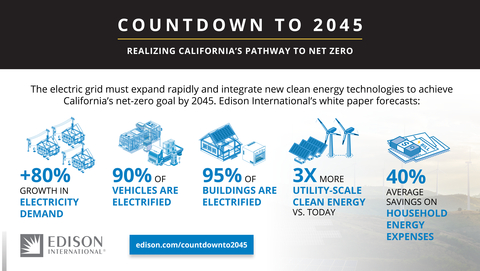The Grid Must Grow Quickly to Achieve California's Net-Zero Goal by 2045
Business Wire 19-Sep-2023 8:09 AM
Edison International's new paper, ‘Countdown to 2045,' calls for expanded electric infrastructure, further deployment of clean energy technologies to support rising electricity demand
Unprecedented innovation across planning, policy and technology is required to achieve California's net-zero goal by 2045, according to a new paper by Edison International. Countdown to 2045: Realizing California's Pathway to Net Zero makes it clear that the electric grid must expand rapidly and integrate new clean energy technologies, such as offshore wind turbines, clean hydrogen, carbon capture and vehicle-to-grid connectivity, well before the deadline in 22 years.
This press release features multimedia. View the full release here: https://www.businesswire.com/news/home/20230918152843/en/

Countdown to 2045: Realizing California's Pathway to Net Zero is an update of Edison International's seminal 2019 paper Pathway 2045. The paper provides an overview of the planning, policy and technology required to achieve California's net-zero goal by 2045. (Graphic: Business Wire)
The scale of electrification needed to decarbonize the economy is dramatic. Countdown to 2045 — announced at Climate Week NYC — forecasts that electricity demand will rise by more than 80%, with 90% of vehicles and 95% of buildings being electrified by 2045 to achieve California's goal to reduce greenhouse gas emissions by 85% from 1990 levels. Through a detailed analysis into grid reliability, Edison International foresees that the state will need an unprecedented pace of clean energy infrastructure buildout.
"The stakes are higher than they have ever been for expanding the electric system to meet decarbonization goals safely, reliably and affordably," said Pedro J. Pizarro, president and CEO of Edison International. "While today's available technologies can achieve significant reduction, policies must encourage greater investment in emerging technologies and enable more options to meet California's net-zero goal."
The paper assesses the scale of the path forward and calls for immediate action. Some highlights include:
-
The average household will save on energy costs. Because of reduced fossil fuel spending and the greater efficiency of electric vehicles and appliances, the average Southern California Edison customer will see a savings of about 40% in household energy expenses by 2045.
-
The grid must support the use of three times more utility-scale clean energy sources than today.
-
Investing must accelerate in emerging clean energy technologies that complement solar generation and energy storage, as they must comprise up to 15% of total utility-scale resources.
-
New transmission and distribution grid projects must be added at up to four times and 10 times their historical rates, respectively.
-
The state will require about $370 billion of incremental transmission, distribution and utility-scale clean-energy investments.
-
Significant reform in planning, permitting and siting processes is required to expedite the buildout.
Countdown to 2045 calls for an additional approximately 90 gigawatts (GW) of utility-scale clean generation and around 25 GW of utility-scale energy storage plus more than 15 GW each of behind-the-meter solar and storage.
This paper is an update to SCE's 2019 Pathway 2045. A key driver for the refreshed analysis is California's Assembly bill 1279, which made the state's net-zero goal into law last year and established a deeper requirement for direct reductions of greenhouse gas emissions. While AB 1279 calls for a feasibility evaluation by 2035, Countdown to 2045 identifies several feasibility challenges that must be taken into consideration quickly, before 2035, as part of the state's ongoing evaluation of options to meet decarbonization goals.
Edison is committed to helping California reach its ambitious goal to mitigate the impacts of climate change and sees this set of approaches as a model for other states and nations. The accelerating effects of climate change include extreme weather events taking place across the country. According to 2023 NOAA data, so far this year, the U.S. alone has seen 23 climate-related disasters that cost at least $1 billion each, surpassing the previous annual record of 22 events in 2020.
For more information and to download the paper, visit edison.com/countdownto2045.
About Edison International
Edison International (NYSE:EIX) is one of the nation's largest electric utility holding companies, providing clean and reliable energy and energy services through its independent companies. Headquartered in Rosemead, California, Edison International is the parent company of Southern California Edison Company, a utility that delivers electricity to 15 million people across Southern, Central and Coastal California. Edison International is also the parent company of Edison Energy LLC, a global energy advisory firm providing integrated sustainability and energy solutions to commercial, industrial and institutional customers.

View source version on businesswire.com: https://www.businesswire.com/news/home/20230918152843/en/



